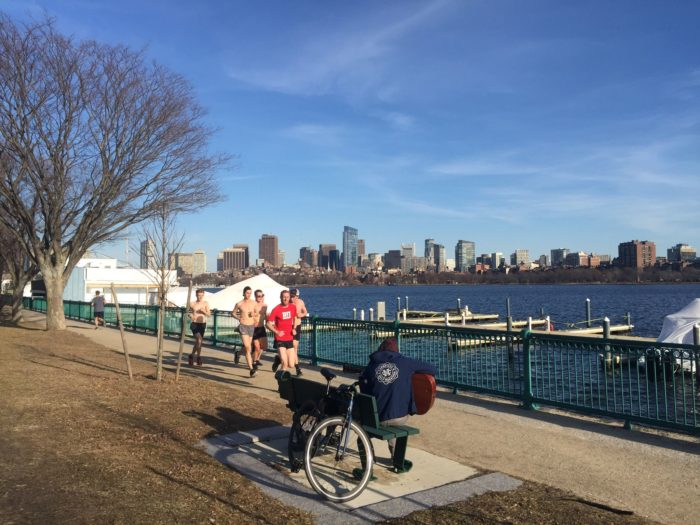
His is a species who, in all its awkward predictability, spawns in wondrous multitudes
During the summer, the banks of the Charles River are spread with swaths of young people. Most in their twenties, they lounge on the docks, gnaw on takeout in the grass, and nap in hammocks stretched between low trees. Couples, families, friends, and ambitious, wheeled travelers weave through the softly stationary crowds, none more conspicuous than the sweaty, shirtless men who lap the trails in an anxious haste, jogging with clenched fists, an oft-pale complexion, and a breathless gaze. This bare-chested Bostonian, endemic to the riverbanks and absent most elsewhere but the beach, is never not remarkable. His is a species who, in all its awkward predictability, spawns in wondrous multitudes. One can’t help but stare—denounce him, relish him, this disturbance-turned-delight.
Even in the summer, this northeastern city scarcely reaches intolerable levels of heat. Yet the running man nonetheless reveals his wet chest to the sun and, invariably, to the eyes of each unassuming passerby. His presence, though fleeting, strikes one like a lightning bolt, imprints itself in each place the sole of his running shoe hits the concrete. In seconds he is far gone—the same magnolias swaying and wild geese lolling—but only in days may he begin to fade away.
Each runner in this scattered fleet boasts his own unique attire: some are hatted (perhaps a baseball cap, perhaps backward), while others hatless; some bear the added mystique of sunglasses (polarized or pitch-black); some wear bulky, wireless headphones, and others the equally unsubtle AirPods, tucked into hairy ears. Their legs are covered to varying degrees, with leggings remaining à la mode in 80-degree weather alongside lazy Chubbies, too-honest Spandex, and baggy synthetic shorts that reach just slightly past the mid-thigh.
So the running man, sticky and steadfast, pushes on through throngs of his strolling, jovial peers (grunting “excuse me” from time to time). His posture, fully exposed, is often thrust upright. His spine, perpendicular to the concrete, reprimands the curvature of those slower and more clothed bodies that surround him. Other shirtless joggers slouch their torsos inward, evoking the austere embarrassment of a roly-poly prodded.
The onlooker, then, cannot help but assume a dermatologist’s eye, cannot resist peering at the runner’s nipples as they come into view. For they are so raw, fleshly, unwonted to the public gaze: the jewels, the manifest eyes of the chest, each man’s a different shade and proportion, some hardened in tension and others supple, flat, maybe cratered. The most marvelous variety is he who jogs with high pecks, his two ornaments reaching up toward the face in a gesture inviting his torso to extend to unprecedented lengths. His nude chest is a canvas, a carnate topography in motion, impossible to ignore.
For many, such strenuous activity demands a certain bodily compression: so, the running man’s chin is found sunken into his glittering neck, shrinking the surfaces where his skin meets the wind. Above each neck is his own marked visage, his expression obscured by varying degrees of facial hair. Pressing forward, the bare-chested Bostonian appears upset, disturbed, at times elated. Like that of a dog, his gaze is unfettered. He may, in passing, lock eyes with yours in threat or salutation (one never knows), or he might avert your stare with such conviction that your mere being in his world, even the world, comes under question.
The shirtless Bostonian is one of the city’s finest, rawest sights in the summertime, outstanding among the waterfowl and rowdy picnickers, parked bicycles, and beloved bridges. He is at once vulnerable and proud, always beheld and seldom touched.
Come winter, I will not forget him.
Becky Zhang is a freelance writer from Hong Kong and based in Cambridge.

